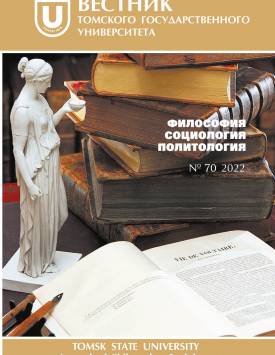Husserl’s phenomenology in the context of metaphysics, antimetaphysics and postmetaphysics
The article aims to establish the relationship of Husserl’s phenomenology to three philosophizing strategies: metaphysics, antimetaphysics and postmetaphysics. The article is divided into three thematic blocks. In the first, the authors analyze the concept of metaphysics in opposition to antimetaphysics. The consideration of metaphysics takes place by referring to Aristotle’s Metaphysics, in which the metaphysical way of philosophizing is concentrated and designated. Auguste Comte’s positivism was chosen to consider antimetaphysics. The result of this analysis is the definition of metaphysics as a philosophical discipline engaged in the search for intelligible principles of the world. Antimetaphysics, on the contrary, does not have a clear definition, but its essence is expressed in the rejection of the metaphysical way of philosophizing. The speculative way of philosophizing is recognized as erroneous by antimetaphysics. In the second block, the authors analyze postmetaphysics based on the program essays of Jurgen Habermas, who is the author of this concept. Habermas identifies four metaphysical (identity thinking, idealism, philosophy of consciousness, a strong concept of theory) and postmetaphysical (procedural rationality, situational reason, the linguistic turn, deflating the extra-ordinary) characteristics that are in opposition to each other. The authors highlight the problem of the lack of postmetaphysical consensus and give a general description of postmetaphysics contrasting it with both metaphysics and antimetaphysics. In the third block, the authors reveal the relationship of Husserl’s phenomenology to the previously established strategies of philosophical thinking. The authors begin by allocating Husserl’s own opinion about metaphysics. This allocation turns out to be difficult, due to Husserl’s rare use of this term. However, in Cartesian Meditations Husserl directly declares the metaphysical nature of phenomenology as the First Philosophy which is a reference to Aristotle. Through an appeal to Husserl’s legacy, the authors prove Husserl’s non-antimetaphysicity. Finally, the authors match Husserl’s phenomenology with four postmetaphysical characteristics. The overall result of the research is the indication of phenomenology as a metaphysical project that includes elements of postmetaphysics. The authors declare no conflicts of interests.
Keywords
postmetaphysics, antimetaphysics, metaphysics, phenomenology, HusserlAuthors
| Name | Organization | |
| Moskovets Semyon A. | Tomsk State University | terawarss@gmail.com |
| Ladov Vsevolod A. | Tomsk Scientific Center, Siberian Branch of the Russian Academy of Sciences; Tomsk State University | ladov@yandex.ru |
References

Husserl’s phenomenology in the context of metaphysics, antimetaphysics and postmetaphysics | Tomsk State University Journal of Philosophy, Sociology and Political Science. 2022. № 70. DOI: 10.17223/1998863X/70/12
